加密飞行 Vol.3 | 何处是我Pop-up的家:Pagoda&Vienna
“我们如何改变激励结构?”
"Crypto Flight" is a series of interviews by Uncommons, focusing on pioneers active in the Ethereum and crypto world. It documents the reality of the crypto space and produces diverse perspectives, using conversation and everyday language as methods to distill distant and far-off truths. Inspired by Antoine de Saint-Exupéry's Vol de Nuit (Night Flight), it symbolizes the challenge and exploratory spirit of cypherpunks and crypto citizens as they venture to the ends of the world.
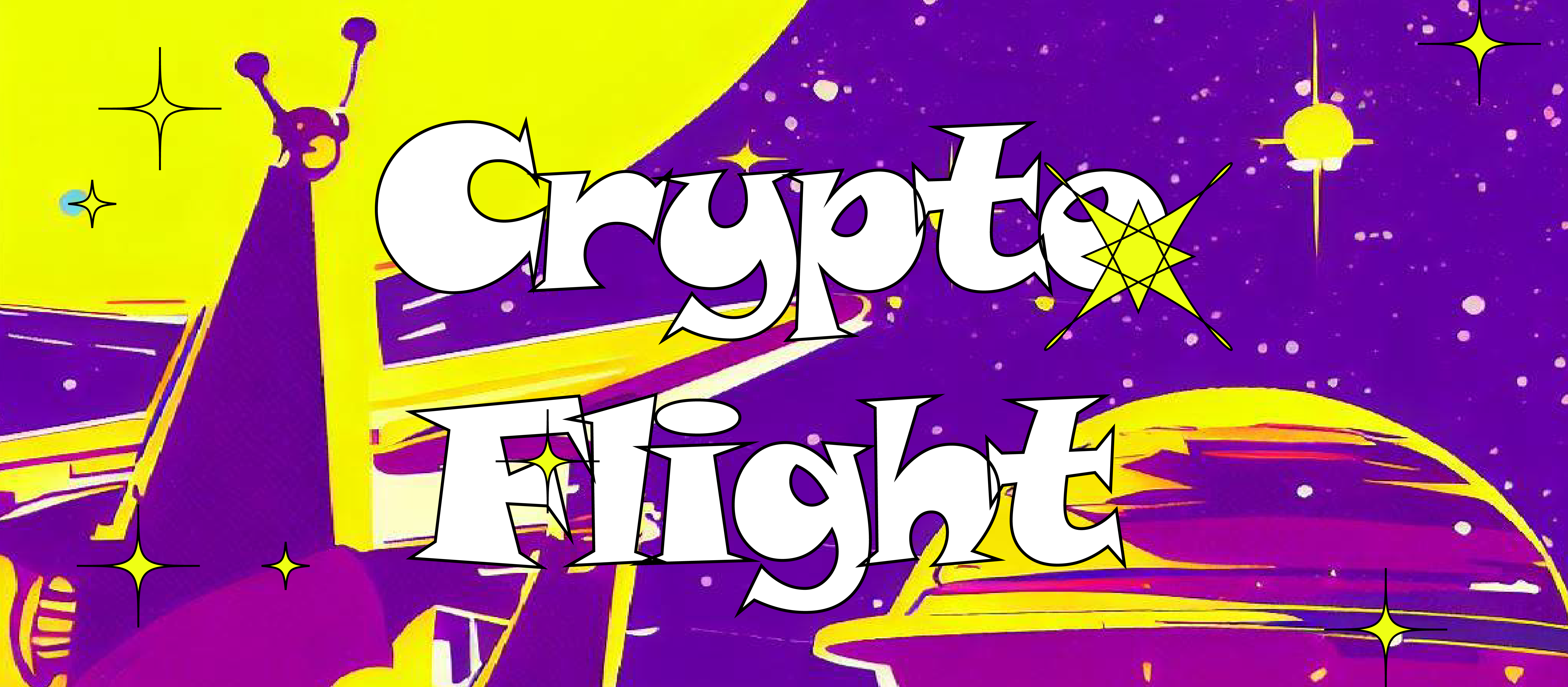
国家,企业,社会:普遍的背叛
State, Corporation, Society: The Ubiquity of Betrayal
内在扬升和探索
Inner Ascension and Exploration
有意社区与快闪城市
Intentional community & Pop-up City
价值革命:福祉,而不仅是收益
Value Revolution: Focusing on Well-being, Not Just Profit
欢宴的余烬:在地与Pop-up City之间的张力
The Embers of Dionysia: Tension Between Locality and the Pop-up City
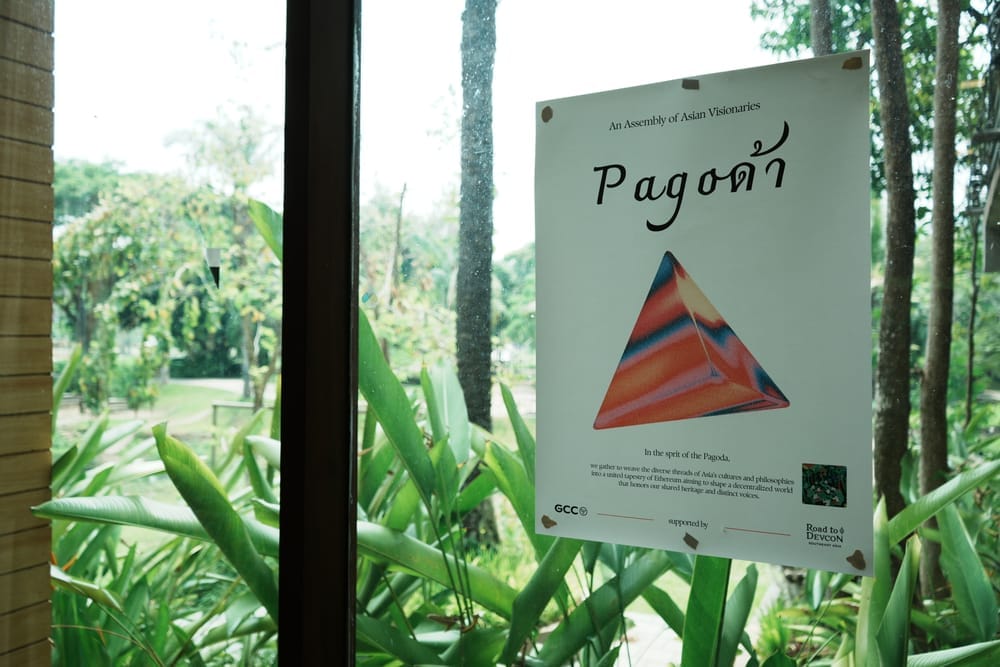
💡Editor's note/编者按
我们从未真正想象过乌托邦,因乌托邦始终在别处。一场场Pop-up City结束后,留在原地的将是太阳、自由、朋克精神、福祉与进步,年轻的社会工程、脆弱的加密信仰,还是一个更加非人化的技术社会,与宴会后残冷的余烬?Crypto正通过各种技术与非技术方式,从一场场实验性的真实交互中完成某种价值演化,这意味着,我们正在亲手创造那些未来我们将要追寻的东西,而它们极有可能依然是封闭、且西方中心主义的。作为一名惯于同巨大结构进行抗争的活动家,Vienna的观察是细致且独具慧眼的:真正对土地产生影响的,是那些扎根于此的公民。
此文是「加密飞行」专栏首辑访谈策划的第三篇,来自友邻社区 SocialLayer 的 Eggy 和 Jiang。作为一群经常在各地巡游的 “飞行员”,他们所带来的独特视野,正是「加密飞行」所想要展示的:一群从过去降落,置身于此刻,并渴望着挑战和探索更好未来的远航者。我们期待着这种展示,能够飞跃语言与物理距离的障壁,成为未来加密公民同现实之间的桥梁。
Social Layer × Uncommons
Reporter: Eggy&Jiang
Translator: MayMay
Edit:0614
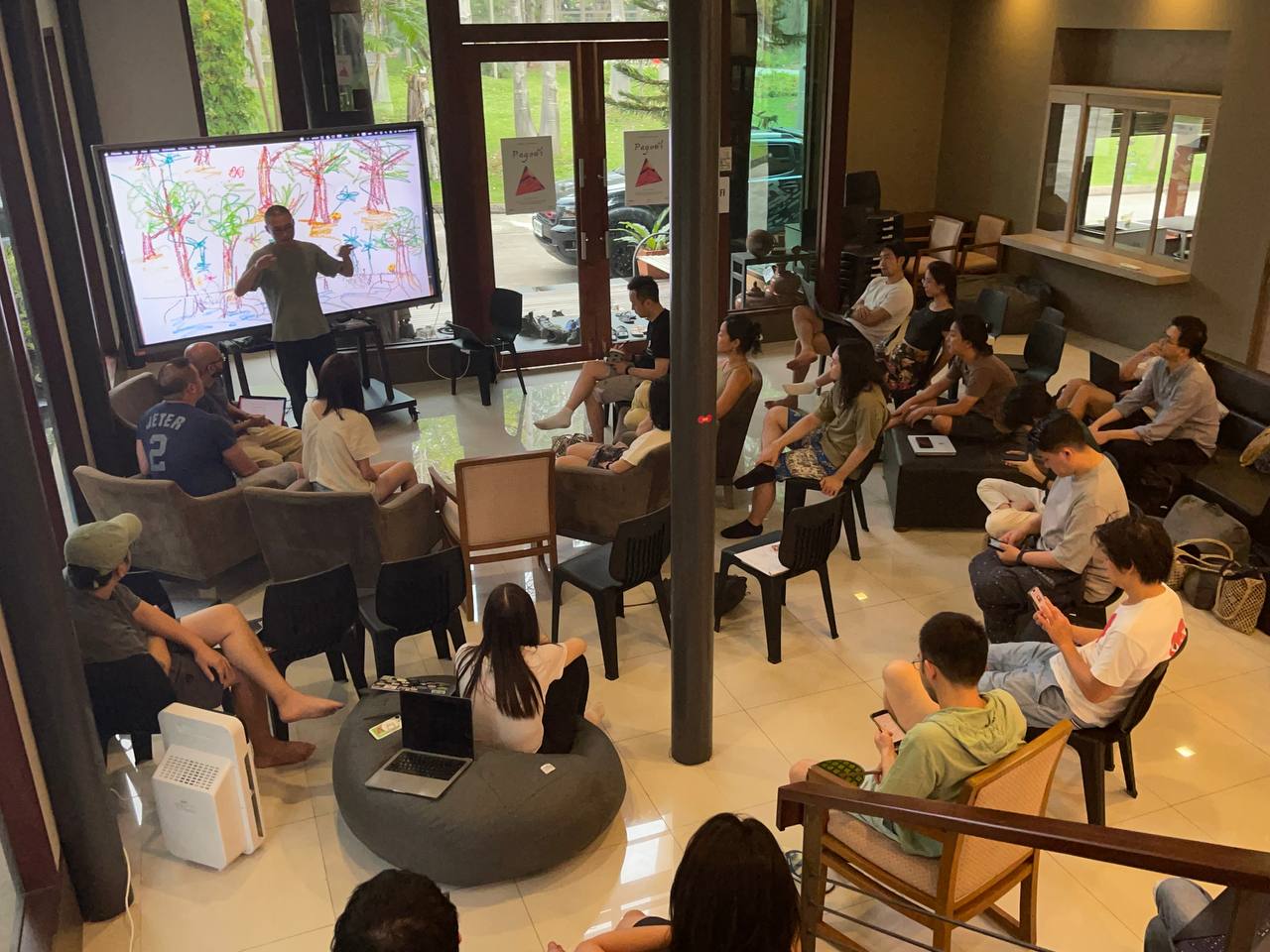
国家,企业,社会:普遍的背叛
State, Corporation, Society: The Ubiquity of Betrayal
Eggy
Why would you like to be involved in this kind of movement, like Pop-up City and all these kinds of prototype social experiments, and what did you do in previous days? Any thoughts on building this kind of new society? And what is the final decision or the less specific moment that makes you decide “Oh, let’s get involved in this stuff”?
你是因为什么而开始参与Pop-up City和其他这些原型社会实验的?在这之前,你在做些什么?是一些新鲜的点子,或者某个让你觉得“我非做不可”的瞬间?
Vienna
More than 10 years ago, I had a near-death experience while participating in a civil movement in Malaysia for free and fair elections. At that time, Malaysia hadn't seen a change in government for 60 years because the elections were manipulated. That experience was actually what led me to get into crypto in 2012. When I first read the Bitcoin white paper in 2011, I thought, “This makes sense,” because I was studying international financial systems and aid at the time. However, I realized that these systems didn’t truly impact the community level, largely because of how the global financial system works. After my near-death experience, I started thinking more about incentive structures. I realized that violence and state control stem from these incentives—how they shape people’s actions and thoughts. That’s when I started asking myself, how do we change the incentive structure?
Back then, my friends were organizing an occupy movement in Malaysia. This was actually before Occupy Wall Street—the first occupy movement in the world took place in Malaysia, a month before the one in the US. We were reading about how the financial system operates, and for me, this was a way to explore alternatives, something different from a system that leaves people in near-death experiences and oppressed. I started working on the civil movement and proposed to about 100 NGOs, representing around 500,000 people, that we needed to come up with a new system. Then, many of my friends were arrested and sentenced to prison.
十多年前我在马来西亚参与一场争取自由和公平选举的公民运动时,经历了一次濒死体验。当时马来西亚已经60年没有经历政府更迭,选举是被操控的。这让我在2012年进入了加密货币领域。2011年读到比特币白皮书时,我觉得“这很有道理”,那时我正在学习国际金融系统和援助。然而我意识到这些系统并没有真正影响到社区层面,这主要是因为全球金融系统的运作方式。经历了濒死体验后,我开始更多地思考激励结构。暴力和国家控制源于这些激励机制——它们影响着人们的行为和思维。这时我开始问自己,我们如何改变激励结构?
接着我的朋友们在马来西亚组织了占领运动。实际上,这甚至是在“占领华尔街”之前——比美国早了一个月,世界上的第一个占领运动是在马来西亚发生的。那时我们在研究金融系统的运作方式。对我而言,这是探索替代方案的一种方式,与一个让人们经历濒死体验并被压迫的系统不同。我开始参与公民运动,并向大约100个非政府组织(大约代表了约50万人)提议,我们需要建立一个新系统。然后,我的很多朋友被逮捕并被判刑。
At the time, I was in the US attending the Buddhist Geeks conference, and my friends told me not to come back. They said, “Go and build the things you’re proposing in the US.” So I stayed in the US for the past 10 years. During this time, I worked on various protocols—technical, social, and organizational. Some of the technical protocols we developed are now used in projects like Agoric. Our startup had brought in advisors like Mark Miller and others who had worked on object capabilities for a long time. We were planning to do an ICO, but they decided to move forward with Agoric without us.
那时我正在美国参加佛教极客大会,我的朋友们告诉我不要回去。他们说:“到美国去建立那些你在这里提议的东西”。我在美国待了10年,致力于开发各种协议——技术、社会和组织层面。现在,我们开发的一些技术协议被用于Agoric这样的项目。我们的初创公司聘请了像Mark Miller这样在对象能力方面工作了很长时间的顾问。我们计划进行ICO,但即便没有我们,他们也决定要推进Agoric。
We faced a huge crisis in the startup. We were planning to launch our ICO within just two months in 2018-2019. However, half of the team left, while the other half wanted to find a way to continue collaborating with Agoric. There was still another piece of our protocol, the distributed staking protocol, which hadn’t been shared with Agoric yet. Some team members thought we could work with Agoric on that as well. But I decided to leave because I felt I couldn’t trust them anymore.
我们的初创公司遇到了巨大的危机。我们计划在2018-2019年内的两个月内启动我们的ICO,然而,团队一半人离开了,另一半希望继续与Agoric合作。我们的协议中还有一部分,叫做分布式抵押协议,还没有与Agoric共享。有些团队成员认为我们可以与Agoric合作开发这部分协议。但我决定离开,我已经不再信任他们了。
I think the advisors that we got are people who are very senior, people who are 50,60 years old and they contributed for a long time. So they did a lot of groundwork on the object capabilities, but really the part that we brought in is how Web 3 or blockchain can interface with object capability. We have the open-source thing and that happens. So now sometimes I think about actually even protecting our own invention is important, even if it's open source. Then I left and I started working on climate economics with this center at Stanford. And so I was looking at how to cool the economy because now the economy is heating the earth, so that's called the Zero Degree project. And then I worked on that for some time until we also won the UN climate change hackathon. However, that was before COVID-19. Although the UN had promised to implement our project globally, after the pandemic hit, they shifted their priorities. The corporate sponsors redirected funding towards organizing more hackathons instead of funding our project, which had won the prize. We got maybe 1,000. But it's supposed to be a lot more.
我认为我们请来的顾问都是非常资深的人,很多人已经50、60岁了,他们为对象能力的基础工作贡献了很多。但真正的不同之处在于,如何让Web3或区块链与对象能力接驳。我们让项目开源,随后发生了这样的事。因此我在想,即使是开源项目,保护我们自己的发明也是很重要的。后来我离开,并开始在斯坦福的一个中心研究气候经济学,关注如何“冷却”经济,因为今天的经济正在加热地球。这个项目叫做“零度”,我工作了一段时间,后来还赢得了联合国气候变化黑客马拉松。这些都是在新冠疫情之前。尽管联合国承诺会在全球范围内实施我们的项目,但疫情发生后,他们改变了优先级。企业赞助商将资金转向了组织更多的黑客马拉松,而不是资助我们已经赢得奖项的项目。关于奖金,我们可能只拿到了1000美元,但本该得到更多。
Eggy
It looks like the trust issue always bumped into you.
看起来,有关信任的问题接二连三地让你困扰。
Vienna
This is why I’ve returned to Asia. During my 10 years in the US, we published a book on post-capitalist protocols and their expression. I believe we made some achievements but also encountered significant trust issues.
这就是我回到亚洲的原因。在美国的10年里,我们出版了一本关于后资本主义协议及其表达的书。我们取得了一些成果,但也面临很多信任问题。
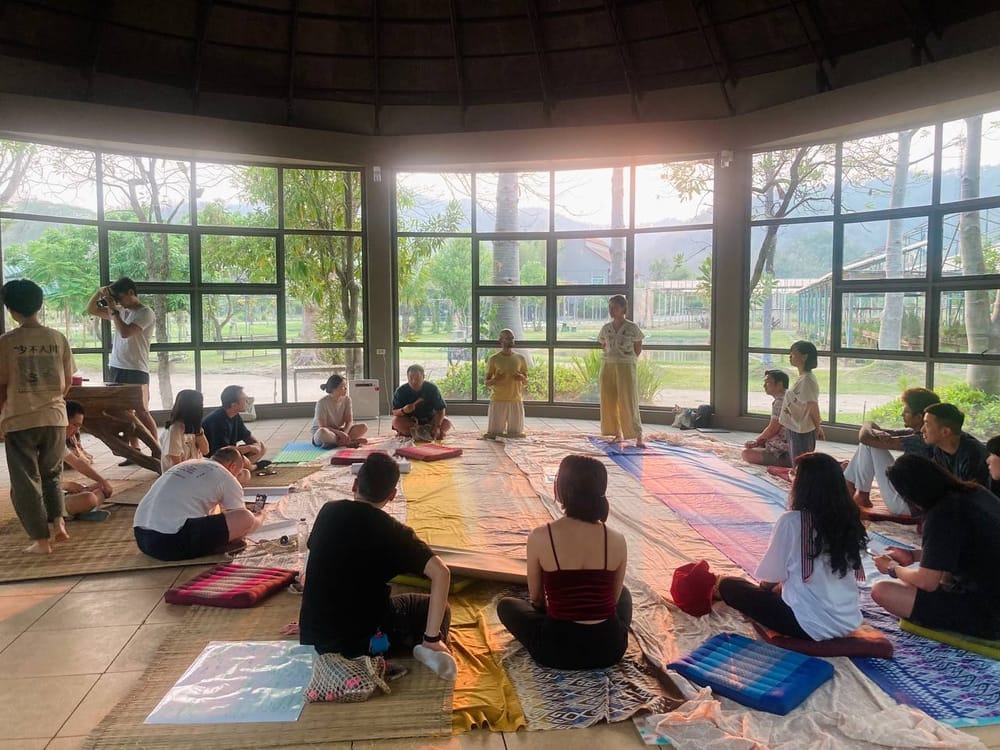
内在扬升和探索
Inner Ascension and Exploration
Vienna
I draw. I went to the Buddhist monastery. I did a temporary ordination. Then after that, some friends of mine told me that I should join Kernel, which is a peer-to-peer web3 fellowship. I was in two monasteries. The second one is more tech-focused because it focuses on existential risk. So looking at AI, looking at Web 3, looking at how to live together even when there is a crisis in the world.
In 2021 I joined Kernel, Songyi and I were in the same cohort. We actually have a lot of common friends. So we were surprised that we hadn't met before that. But that's why we have a project together at Kernel. Back then I called it ChiPunk like Solar Punk, but I wanted people to focus on inner well-being. So I call it Qi Gong, the Qi. But I always wanted it to have a vibe, not like a formal project. It's just how you show up.
我开始绘画。我在佛教寺庙做了短暂的非正式出家,后来一些朋友告诉我应该加入Kernel,这是一个点对点的Web创作团体。此前我曾经在两个寺庙待过,其中第二个寺庙更关注科技,尤其是生存风险,我们在里面研究AI、Web 3,研究如何在世界面临危机时仍然能够共同生活。
2021年,我加入了Kernel,Songyi和我在同一个小组。我们有很多共同的朋友,所以我们很惊讶之前没见过面。但那就是我们在Kernel一起做项目的原因。当时我叫它ChiPunk,就像太阳光能“Punk”一样,我希望人们专注于内在的幸福。但我也一直希望它是一种氛围,而不是正式的项目。它只是一种你如何展现自己的方式。
At that time, Lawrence Wang, Songyi, and I were involved in the ChiPunk project. The initiative aimed to support young activists from the Global South, particularly from Asia and other regions outside of the U.S. Its goal was to provide funding for these young individuals to pursue their work. The project was similar to Kernel but focused specifically on climate change and systemic transformation. I believed that meaningful progress on climate change would only come through systemic change.
However, after a certain point, it became clear that we needed to adapt to the reality. We cannot prevent climate change solely through system change. When the deadline arrived, I realized I needed to shift my focus more toward Buddhist economics and Kernel. This required time for reflection. It was challenging because I believed that changing the system could help prevent climate change and reduce the loss of lives. Now, I'm less certain about that.
当时,Lawrence Wang、Songyi和我参与了ChiPunk项目。该项目旨在支持来自全球南方的年轻活动家,尤其是来自亚洲及其他非美国地区的年轻人,目标是为这些年轻人提供资金,支持他们的工作。这个项目类似于Kernel,专注于气候变化和系统变革。当时我认为只有通过系统变革,才能在气候变化方面取得有意义的进展。
然而,在之后的某个节点,我意识到我们必须适应现实。仅靠系统变革无法阻止气候变化。当气候变化的期限到来时,我需要更多地将精力转向佛教经济学和Kernel。这对我来说很难,因为我曾经相信,改变系统可以帮助预防气候变化,减少生命损失。但现在,我不再那么确定了。
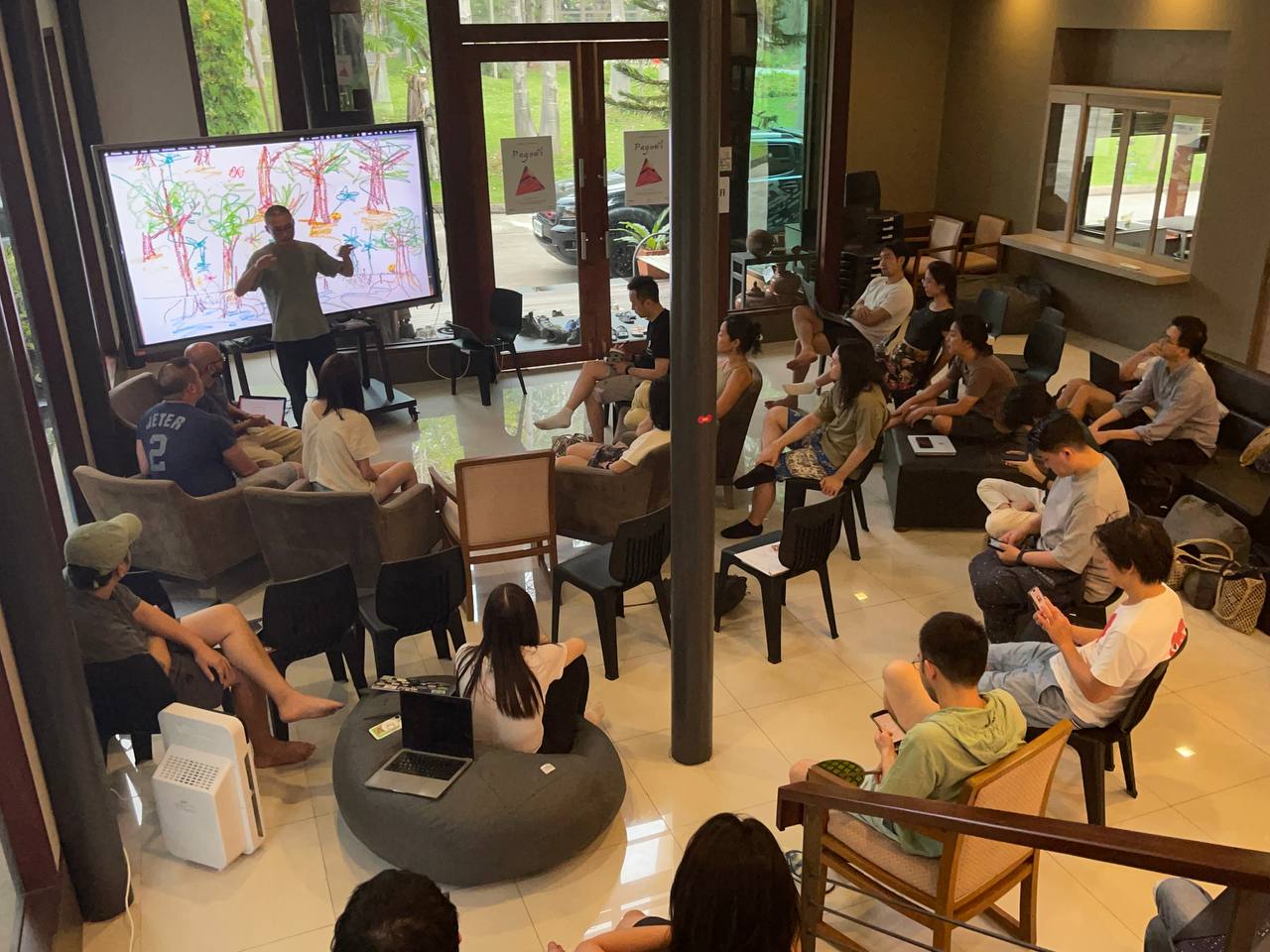
有意社区与快闪城市
Intentional community & Pop-up City
Eggy
How do you hear about Edge Esmeralda and what made you decide to get involved in it?
那么你是如何听说Edge Esmeralda的?是什么让你决定参与其中?
Vienna
Songyi invited me to join ABCD (Asia-Based Community DAO) in Korea early last year. But I was back in Malaysia and I wanted to set up a hacker house in Kuala Lumpur. At that time, I used most of my crypto fund (or my family did) to renovate the house I grew up in to turn it into a hacker house. I was busy with that, so I didn’t attend the ABCD events. Later, Songyi asked if I wanted to work on the Pagoda project together. Since I had more time then, I agreed, and through that, I connected with Janine. I was working on Pagoda in Kuala Lumpur, while Janine was looking for a location in Southeast Asia to host Edge City. So she contacted us and asked about Malaysia. We went on trips to look at different locations. I believe this is a concern for many Southeast Asian countries—Edge City reaches out, and they spend a lot of time searching for a location for Edge City and then eventually…They found Pagoda. I think Janine reaches out to a lot of countries individually, but the funny thing is we all like, “Wow, you have the same experience. So we have the same experience.”
去年年初,Songyi邀请我加入韩国的ABCD(亚洲社区DAO),但那时我已回到马来西亚,计划在吉隆坡建立黑客屋。我用大部分的加密资金(或由家人代为出资)翻修了我成长的房子,将其改造成黑客屋,因此忙于这件事,未能参加ABCD的活动。之后,Songyi问我是否想一起做Pagoda项目,当时我时间较为充裕,便同意了,也因此认识了Janine。我在吉隆坡负责Pagoda的工作,而Janine则在寻找东南亚举办Edge City的地点。她联系了我们,询问马来西亚的情况。我们随后考察了多个地方。我认为这也是东南亚许多国家的一个困扰,Edge City联系他们后,他们投入大量时间寻找Edge City的地点,最终成立了Pagoda。Janine触达了很多国家,但有趣的是,我们都感觉:“哇,我们有相同的经历。”
Eggy
Have you heard about Zuzalu and Edge or this kind of social experiment before? What do you think about that? And after you've been involved in Edge City, like helping with the coordination or just being involved in Edge Esmeralda. What's your feeling? Has anything changed or do you still feel very promising about this?
你之前听说过Zuzalu和Edge,或者类似的社会实验吗?你对此有什么看法?在参与Edge City之后,帮忙协调工作以及参与Edge Esmeralda后,你的感觉是什么?有什么改变吗?你是否仍然对这种事物感到非常有希望?
Vienna
I've always been interested in Pop-up City, even 10 years ago, my friends used to do the Honduras project like ZEDE(Zone for Employment and Economic Development), in Honduras, they created a zone. It started more than 10 years ago. There's more ZEDE in Honduras, more than one. Próspera is part of it. And I have always been interested in that. And my friends were working at Seasteading Institute, which is to build a city in the ocean.
https://en.wikipedia.org/wiki/Pr%C3%B3spera
我一直对Pop-up City感兴趣,甚至10年前,我的朋友们就在做类似于洪都拉斯项目的事情,比如ZEDE,在洪都拉斯他们创建了一个特别的区域。这已经开始了超过10年。洪都拉斯有不止一个ZEDE。Próspera是其中的一部分。我一直对此感兴趣。我的朋友们也在做海上建城计划(Seasteading Institute),他们的目标是在海洋上建造城市。
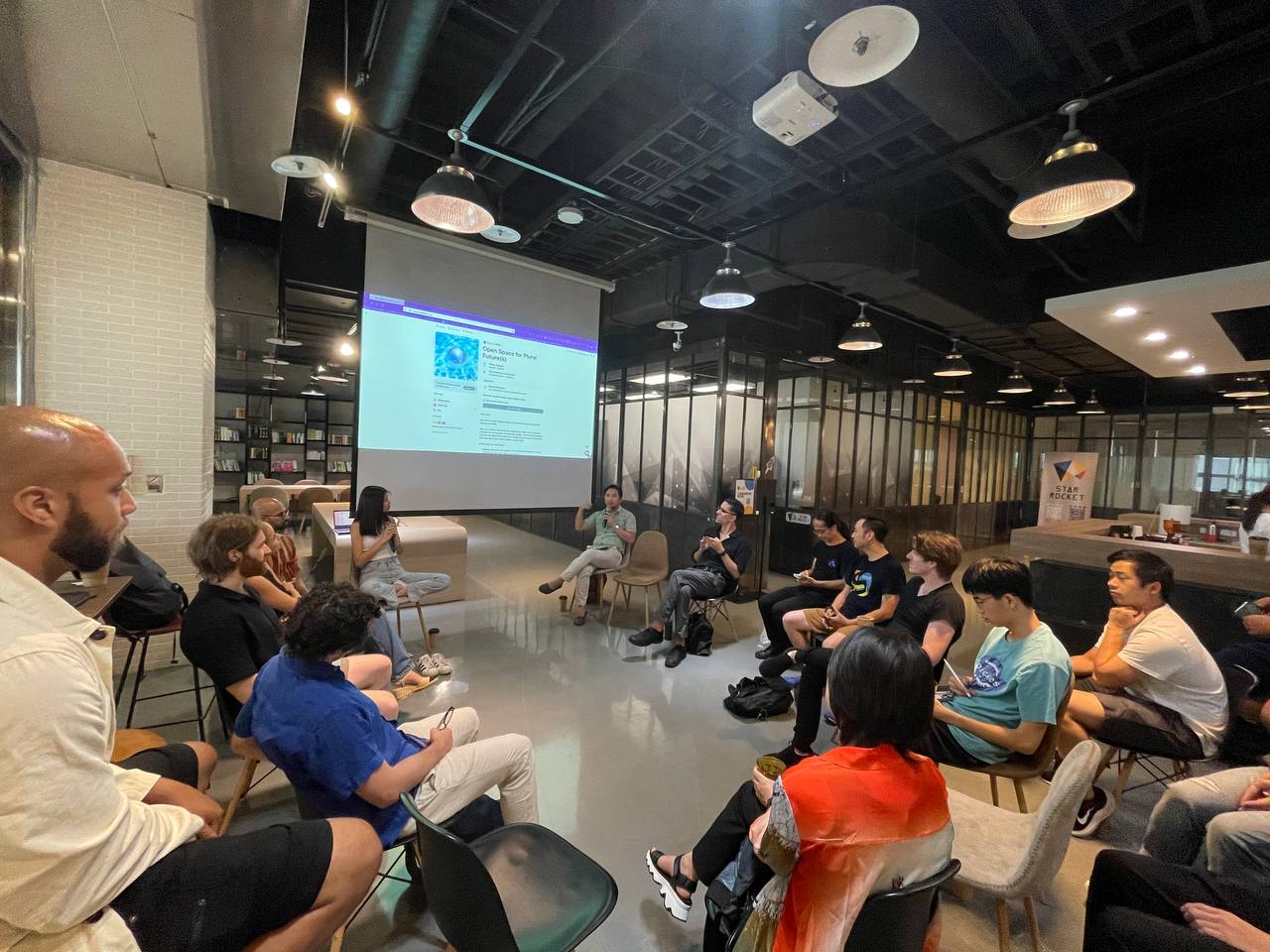
价值革命:福祉,而不仅是收益
Value Revolution: Focusing on Well-being, Not Just Profit
Eggy
I heard from Devon’s presentation about Esmeralda, where she talked about building something from scratch. I think there are two ways of thinking about this kind of transition. One way is to find places that support your ideas and then build something new. The other is to try and fix what's already there and change it from within. I get the impression that in Popup City, many people are focused on building something new and, in doing so, tend to ignore existing problems. For example, in San Francisco, there are many different issues people are dealing with, but instead of addressing those issues, they just want to attract some talent from this city and try to build a new subsidy for this kind of people. Maybe that’s why they’re taking a similar approach in Thailand.
我从Devon的演讲中听说,他们正在从零开始构建一些东西。在我认为,这种转变中有两种思路。一种是找到支持你想法的地方,然后在那里建立一些新事物。另一种是尝试修复现有的东西,并从中进行改变。在Pop-up City里,很多人专注于建立新的东西,在过程中往往忽视现有的问题。例如在旧金山,有很多不同的问题需要处理,但有些群体只想吸引人才,建立一个新的属地。我猜这也是为什么他们在泰国采取类似的方式。
Vienna
From a Buddhist economics framework, this approach makes sense because Thailand is a Buddhist country. Thai Development monks have been working with communities for over 30 years. They help people who are homeless or in need, but you don’t see as much of that problem here as you do in places like San Francisco. That’s because people in Thailand have what I call basic well-being or a basic safety net. Family structures are stronger, communities are more tightly knit, and there’s a network of temples where monks actively work with the local community.
The basic principle in Buddhist economics is that you’re not better off just because you’re individually better. You’re better because you’re part of an ecosystem that supports the well-being of everyone, which in turn makes you happier too. That’s why places like Bhutan don’t focus on GDP but on Gross National Happiness. It’s a fundamentally different way of thinking about well-being. I’m sure you’ve seen Kelly, right? He’s part of the HCD team.
从佛教经济学的角度来看,这种做法是有道理的,泰国也是一个佛教国家。泰国的“发展僧侣”已经与社区合作了超过30年,他们帮助无家可归者或有需要的人。这里的无家可归者不像旧金山那么多,这是因为在泰国,人们拥有我称之为的“基本福利或安全网”。家庭结构更强大,社区更加紧密,还有一个由寺庙组成的网络,僧侣们会主动与当地社区合作。佛教经济学的基本原则是,你的生活不是因为你个人的成功而变得更好,而是因为你处于一个支持每个人福祉的生态系统中,因此你也变得更幸福。这就是为什么像不丹这样的国家不关注GDP,而是关注“国民幸福总值”(Gross National Happiness)。这是完全不同的福祉观念。
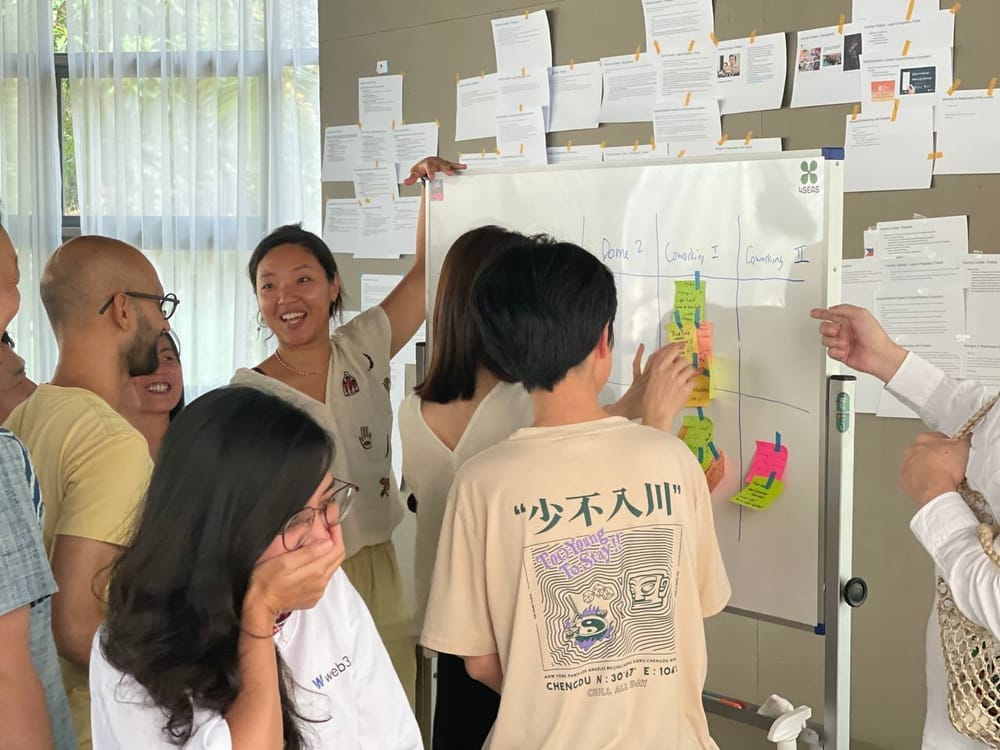
Eggy
Is there any kind of infrastructure—whether it’s technical or social—that you think is crucial for building an intentional community?
你认为在建立一个意向性社区(intentional community)时,是否有某种基础设施,无论是技术的还是社会的,是至关重要的?
Vienna
I’m really excited about decentralized supply chains. I think that’s one of the unique values that blockchain or Popup City can bring. In Buddhist economics, we talk about “right relationships,” which is about being respectful and responsible. I want to integrate the local community, not just by giving them money in exchange for services, but by creating meaningful relationships. For example, we want to map out not just Chiang Mai but also the farms and businesses that practice farm-to-table, meaning they have a direct relationship with the farms where the food comes from.
我对去中心化的供应链感到非常兴奋。我认为这是区块链或Pop-up City可以带来的独特价值之一。在佛教经济学中,我们谈论的是“正确的关系”(right relationships),这是关于尊重和责任。我希望能够真正地整合当地社区,不仅仅是通过资金换取服务,而是通过建立有意义的关系。例如,我们不仅是在清迈,还要考虑那些从农场到餐桌(farm-to-table)的农场和企业,这意味着他们与食物来源的农场有直接的关系。
By doing this, you’re not relying solely on a global supply chain—you’re supporting the local community. I want to see local communities like those in Malaysia and Thailand linked together, so it’s not just one Popup City but part of a long-term relationship. At Pagoda, we’ve even talked about ideas like an Asia L2, and we joked about creating an Initial Pagoda Offering—an IPO for community currency. It’s like our own community currency that can help businesses and locals feel like they’re part of something unique and valuable. It's like our own community currency so that, the people and the businesses can feel like, “There's something unique here”.
通过这样做,你不仅仅依赖全球供应链,你还在支持当地的社区。我希望能看到像马来西亚和泰国这样的地方社区联系在一起,不仅仅是一个Pop-up City,而是成为长期关系的一部分。在Pagoda,我们甚至讨论过类似亚洲L2的想法,半开玩笑地说要创建一个“初始Pagoda发行”(Initial Pagoda Offering)——一种社区货币的IPO。这就像我们自己的社区货币,可以帮助当地的企业和居民感受到这里发生了一些独特而有价值的事情。
Eggy
We're trying to integrate with these “edges”(Community Currency) experiments in Edge Esmeralda by RadicalxChange in SoLa(Social Layer) as well. But we still need some time to work on it.
我们在努力将这次的社区货币“edges”集成在Social Layer中,但仍然需要一些时间来完成它。
Vienna
I feel like once the token is introduced, as someone joked, there’s really no other way for the community to be sustainable than by launching its own token.
我觉得一旦引入代币,正如一些人开玩笑所说,社区唯一可持续的方式就是推出自己的代币。
Eggy
Yes, I think that’s true because when it comes to building a community, you’re not necessarily trying to turn it into a company or a production organization. The goal is for people to live there and live their lives. Life itself doesn’t make money, right? That’s why many people think, “Okay, let’s build a community and then make it commercial.” But I have my doubts about that. I believe these should be two separate things.
这确实是事实。因为当你建立一个社区时,你并不是试图把它变成一个公司或生产组织。你的目标是让人们在那里生活,过自己的生活。而生活本身是无法创造收益的,对吧?所以,这也是为什么很多人想“建立一个社区,然后商业化”。但我对此持怀疑态度。我认为这两者应该分开。
Vienna
Exactly. For example, we know some great people, like artists who can create merchandise, and I even have family members who run tour companies, not just in Thailand but also in Brunei, Singapore, and Malaysia. It’s important to support good businesses. That’s where a community currency could come in. In Buddhist economics, we already have examples of this in the network. Sri Lanka, another Buddhist country, has done a great job with this. They have thousands of good businesses on their good market platform.
确实如此。我们认识一些很棒的人,比如那些制作周边商品的艺术家,我有一些家人也经营旅行社,不仅仅是在泰国,还包括文莱、新加坡和马来西亚。支持好的企业也很重要。这就是为什么我们可以有社区货币。在佛教经济学中,这已经有一些例子了,比如斯里兰卡,另一个佛教国家,他们在这方面就做得非常好,有成千上万个好企业在一个良好的市场平台上。
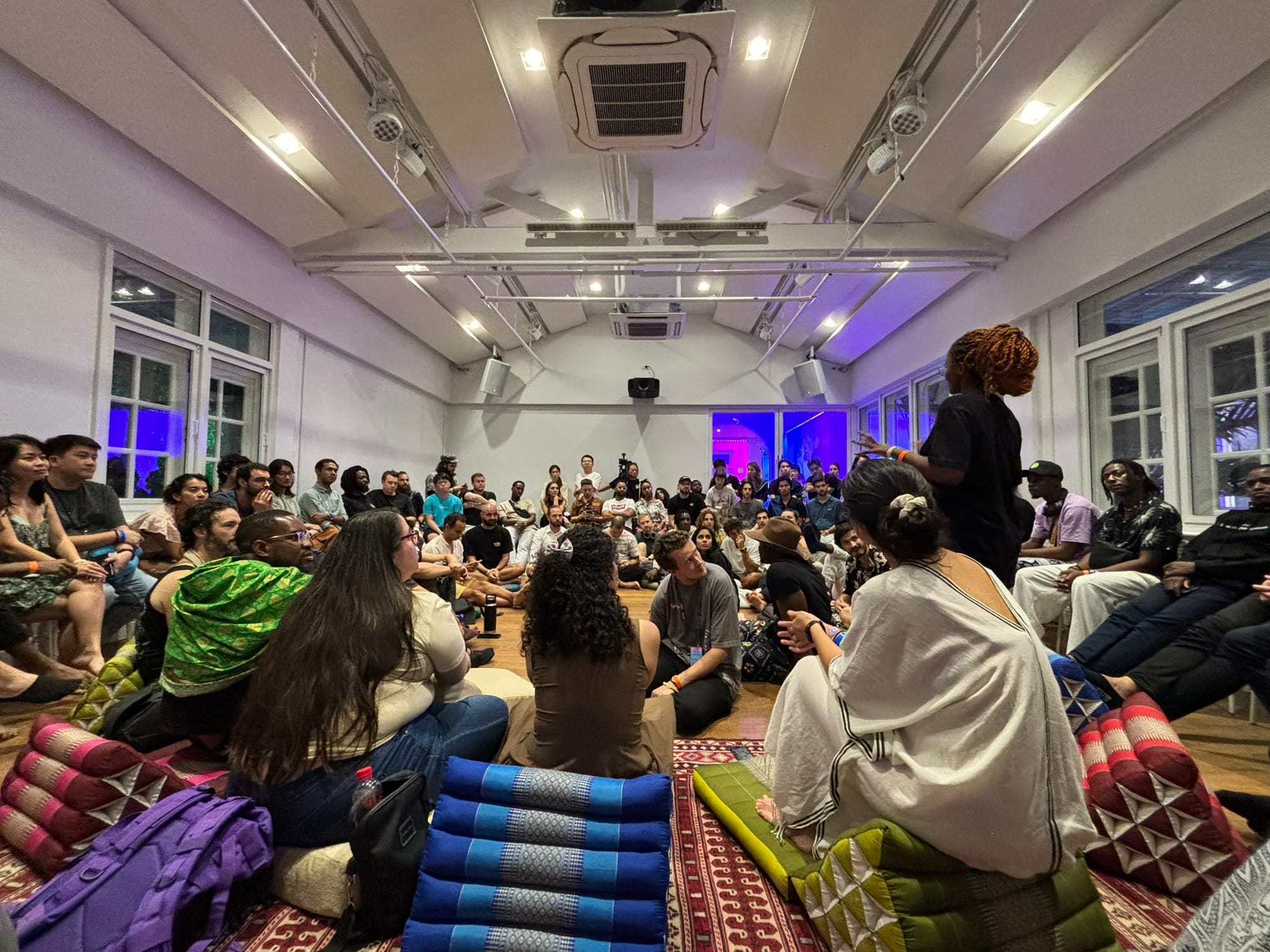
欢宴的余烬:在地与Pop-up City之间的张力
The Embers of Dionysia: Tension Between Locality and the Pop-up City
Vienna
We were already experimenting with starting an intentional community in the Bay Area multiple times. And when I read Balaji’s network state, I actually don't think that this is exactly what I'm looking for. And then when I, your friends who went to Zuzalu and ZuConnect, I feel like it's still not exactly the model that I believe in. I also hear that, you know, it's often done in like, not less integrated. It's not really connected to the local community. And I think that there are a lot of problems that the Honduras project faces in there's conflict between the locals and the people who come in. We need to have governments that like to innovate.
我们已经多次在湾区实验创建意向性社区(intentional community)。当我读到Balaji的《网络国家》(Network State)时,我并不觉得这完全是我在寻找的东西。当我听说朋友们去参加Zuzalu和ZuConnect时,我也觉得那仍然不是我所相信的理想模式。我还听说这些项目通常不是那么“融入”,它们并没有真正与当地社区连接。我觉得洪都拉斯项目面临的一个很大问题是,外来者和当地人之间的冲突。我们确实需要有创新的治理方式。
And I have talked to friends who are doing popup city in the digital nomad space. This is more Web 2 than Web 3. There is a digital Nomad insurance company which is called SafetyWing and Plumia is their moonshot goal (https://plumia.org/about/). They want to get platforms where you can apply one time and all the governments will approve if they get a digital nomad visa. But then, they wanna form something kind of like in Southeast Asia, where we have an APEC business visa. They don't wanna do that. Eventually, they wanna a passport. Of course, it's gonna be very challenging, but they're actually talking to governments including Malaysia, which for them, the Malaysian government is the furthest. So they do a Pop-up city in Malaysia too.
我也和一些在数字游牧空间(digital nomad space)做Pop-up City的朋友们聊过。这更多是Web2而不是Web3。他们有一家数字游牧保险公司,叫SafetyWing,Plumia是他们的宏大目标(https://plumia.org/about/)。他们希望创建一个平台,人们只需要进行一次申请,随后所有政府都会批准他们的数字游牧签证。最终他们想要形成类似东南亚的APEC商务签证那样的东西。这将非常具有挑战性,实际上他们正在与包括马来西亚在内的政府进行对话,马来西亚政府在这一点上进展得最快。所以,他们也在马来西亚做Pop-up City。
Spending in Edge Esmeralda is special for me because I see my friends in the Bay Area who have been typically in more web 2 and healing, focusing on well-being healing. I used to organize consciousness hacking, which is bio-hack technology coming together with my web3 friends that are distributed around. And I think that's special for me. At Pagoda, we have some concerns about how Edge City is approaching Southeast Asia. We don't feel they fully understand how things work at the value system. It's kind of like the British coming to Malaysia (also China and India) and they divide the different communities. They like to use each other, and sometimes against each other. And I was like, “we have the feeling that why are they doing that? We're already connected”.
参与Edge Esmeralda对我来说是特别的,因为我看到在湾区的一些朋友,他们通常更多地参与Web2和疗愈领域,关注身心健康。我曾经组织意识黑客运动(consciousness-hacking movement),这是我做生物黑客和分布在世界各地的Web3朋友汇聚起来的地方。对我来说,这是特别的。在Pagoda,我们对Edge City在东南亚的做法有些担忧。我们觉得他们并没有完全理解当地的运作方式和价值体系。这有点像英国人来马来西亚(还有中国和印度),他们分化了不同的社区,试图让这些社区彼此对抗。而我们则觉得:“我们已经形成了连接,为什么他们还要这样做?”
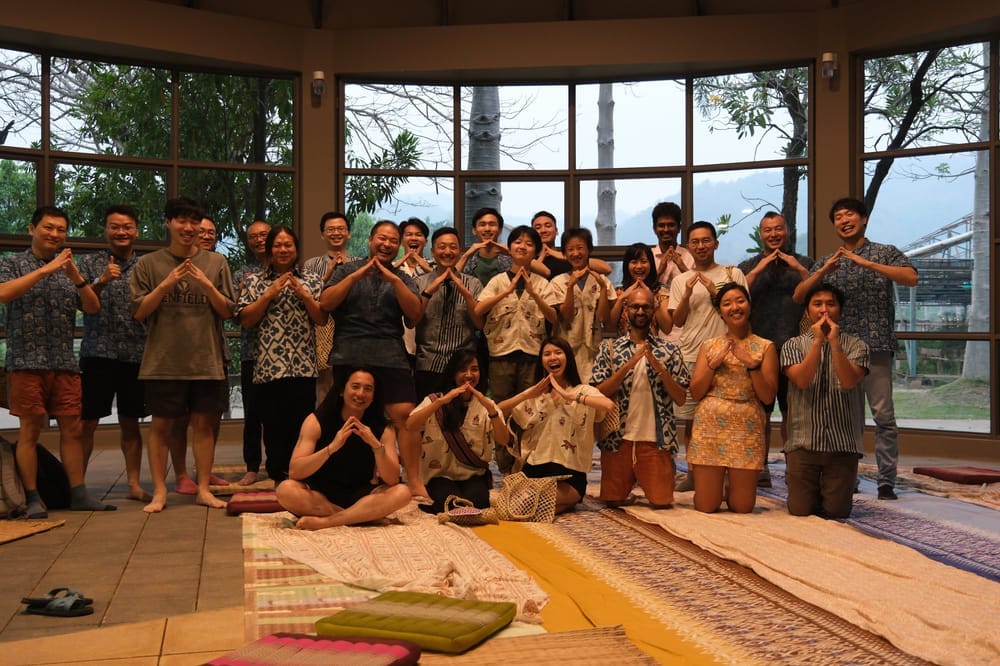
I am both a supporter of Popup City, and I also care about how it’s done and the value it creates. That’s why we’ve been working with our partners, who trusted us with about $80,000, but we need to cover everything—operations, programming, design, and so on. It’s been honestly difficult to negotiate that with Edge City. They offered us another residency, but we didn’t want the "Pagoda Residency." We questioned the purpose behind it, asking, why would we just build a house? It feels like the same experience we see when people from Asia attend a global conference and end up in their own "hacker house," but in this case, we are supposed to be the hosts. What we want is to create a challenge statement that addresses the problems the region is facing, and we want to provide the context for those issues. We also want to weave together different groups, both local and global, to create connections that can help tackle these challenges.
我既是Pop-up City的支持者,也非常关心它的实施方式和它所创造的价值。因此,我们一直与合作伙伴合作,他们给了我们大约8万美元,但我们需要覆盖所有方面的费用,包括运营、编程、设计等等。与Edge City的谈判实际上相当困难。他们给我们提供了另一个居住计划,但我们不想要“Pagoda Residency”。我们对此提出质疑,为什么我们要仅仅建造一个房子?这感觉就像亚洲人去参加全球会议,却最终进入自己的“黑客屋”一样,但在这个情况下,我们(当地人)才应该是主人。我们想做的是提出一个挑战声明,明确指出该地区面临的问题,并为这些问题提供背景。我们还希望将不同的群体联系在一起,既有本地的,也有全球的,以便创建能够帮助解决这些挑战的联系。
Eggy
Do you think the issue is that some people from the West are still trying to impose their knowledge, or are they expecting local support while still maintaining control? Do you see this as the main challenge in your participation, or is there something else?
你认为问题出在某些西方人仍然试图传播他们的知识,还是他们期望获得当地的支持,同时仍然保持控制权?你觉得这是你们参与中的主要挑战,还是还有其他问题?
Vienna
This is the most challenging part, but it also leads to several second-order problems. For example, we have a challenge in trying to connect local micro-enterprises with social enterprises. Our goal is to create a network of these enterprises and build a supply chain that benefits everyone involved. That way, when we leave Chiang Mai, all the people involved will feel like, “Oh, that was great”.
我认为这是最具挑战性的一部分,它也引发了许多次级问题。例如,我们面临的一个挑战是如何将当地的微型企业与社会企业联系起来。我们的目标是创建这些企业的网络,并建立一个对所有人都有利的供应链。这样,当我们离开清迈时,所有参与的人都会觉得,“这真是一个很棒的经历”。
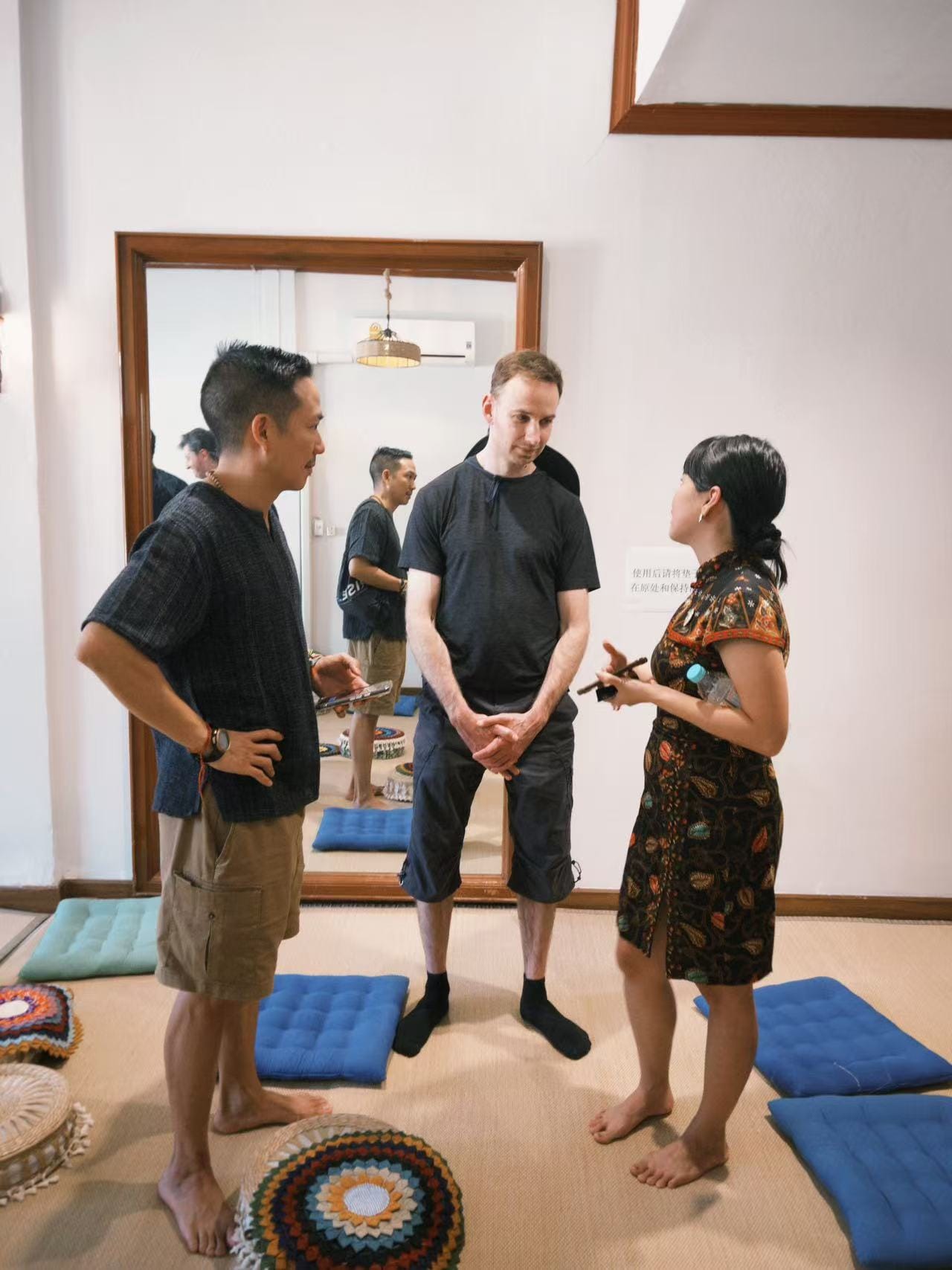
在翻译这篇采访时,我为Vienna的早期流亡经历和后期对社会变革的广泛探索深深动容。从马来西亚的公民运动到在硅谷参与区块链和加密货币领域的探索,Vienna展示了一种将佛教、技术、经济和社会问题交织在一起的独特视角,尤其是将入世佛教作为个人和结构变革工具。她对全球系统性问题(如气候变化、政治腐败)具有广泛关注和深刻洞察,广泛参与于意识黑客运动(consciousness-hacking movement),斯坦福气候变化经济学项目Project Kelvin,COALA & Zero Degree Project,Pop-up City项目Pagoda,跨学科同伴学习网络机构Kernel等。
由此,我们可以看到一位前瞻性的区块链技术探索者、一位致力于社会变革的激情社会运动家,如何力图让科技在资源分配管理、去中心化治理和个人身心发展方面产生积极影响,构建人类更美好的、更公正平等和可持续的未来。而除了这些宏大的愿景,Vienna提出的关于佛法与国际金融体系融合的思考框架,以及ChiPunk思想,都非常有意思,融合东方和西方文化精髓。这十分可贵,在她看来,西方个人主义文化让人几乎完全集中在自我发展上,缺少关注社会结构性问题,而如果要充分解决地球和人类社会越来越多的现代性危机,需要有效利他主义,需要技术、算法之外的“佛法意识”,即小Ego,认识到自身行为对他人及社会的影响。
翻译过程中,我尽量保持了原文的完整性与清晰性,特别是那些涉及技术和佛教经济学概念的部分。此外,Vienna的个人经历和对东南亚发展的情感也是一大重要部分,她对早期经历信任危机的反思和对未来社会构想的希望交织在一起,形成了她独特的思考框架。这次翻译不仅让我深入了解了她作为一位Social Activist的思想,也让我开始反思技术与社会变革之间的复杂关系。
非常巧合的是,就在我翻译完稿件后的一个月内,在清迈11月的Edge City,我有幸偶遇(Pop up with) Vienna,她非常热情的邀请我参与Energy Healing,我们还有社区的其他朋友从下午5点一直在一起待到了晚上11点,共同进行了高密度的聊天交流,Vienna谈到自己正在进行的一些新的项目,烛光映在她的眼眸中,坚定而澄澈——她对通过技术解决人类社会发展结构性问题的热情从未变过,一如她在许多年前参加黑客马拉松和香火聚会一样,但变得,如她所说,更“脚踏实地”了。
总之,在这篇对Vienna个人经历采访中,我们可以从时间维度回溯她在探索区块链技术应用于帮助本地原住民发展、减缓气候变化、优化组织结构探索的复杂经历。Vienna也直言不讳关于Pop-up City构建和发展过程中的挑战和问题,这为我们探索未来社会实验的方向提供了非常有价值的参考。希望这篇译文能够帮助更多人了解Vienna Rae的故事,并从中获得启发——无论是在技术探索、跨学科研究还是社会变革创新领域。
Social Layer × Uncommons
Reporter: Eggy&Jiang
Translator: MayMay
Edit:0614
👇文中图片来源
Songyi / Quinn / Jacky
X @Pagodasia
Maymay
Who we are 👇
Uncommons
区块链世界内一隅公共空间,一群公共物品建设者,在此碰撞加密人文思想。其前身为 GreenPill 中文社区。
Twitter: x.com/Un__commons
Newsletter: blog.uncommons.cc/
Join us: t.me/theuncommons
Social Layer
一个主观的、关系型的、可编程的,由 SBT 构建的社会网络,可以将你的关系价值结晶为链上徽章,你可以在这个网络中呈现出一个体现你的多元角色、价值观和共识的去中心化身份,你也可以通过可组合徽章的将社区中的关系结构编译为代码并开源共享,实现人人可参与的可编程社会网络愿景。
Twitter: x.com/SocialLayer_im
Matters: matters.town/@sociallayer_im
Join us: t.me/sociallayer_im
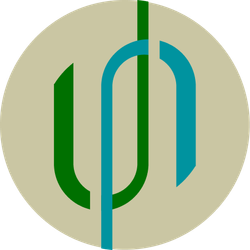

Discussion